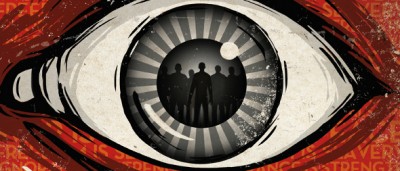UK Moves One Step Closer to Orwell’s 1984 Nightmare

In the United States, government officials responded to Apple and Droid’s new encryption services by throwing temper tantrums in speeches and making archaic arguments in court. In the United Kingdom, home of big brother and big brother to the U.S., they simply want to ban forms of communication they cannot intrude upon.
British Prime Minister David Cameron drew media attention this week when, in response to the Paris terrorist attacks, he said
“In our country, do we want to allow a means of communication between people which […] we cannot read?”
He is opposed to the reality that encrypted data on services like the iPhone’s iMessage (iPhone to iPhone texting) and international communication app “WhatsApp” cannot be accessed, even with a warrant, and suggested such tools should be outright banned. Droid operating systems would also fall into this category. Cameron’s statement has strong implications in implying that people should not be allowed to communicate unless the government is privy to it.
Cameron’s comments came as a part of a broader push for more state surveillance powers in the name of “safety.” Legislation
nicknamed the “snooper’s charter” was blocked previously by liberals in the British legislature, but Cameron is pouncing on the Charlie Hebdo tragedy to push for support in a newer version. He will re-introduce the bill if he wins the next general election, set for May of this year.
Director of Big Brother Watch, Emma Carr, condemned such a move:
“It is the wrong solution and would divert resources from focused surveillance operations at a time when
the agencies are already struggling to cope with the volume of information available.”
Since Edward Snowden’s leaks in 2013, there has been powerful opposition to state surveillance. However, many citizens
cower to privacy violations when global tragedies occur and lawmakers exploit the surrounding fear to expand state reach. It is difficult to believe that the British people would tolerate banning many of the world’s most common and convenient forms of text messaging, but Conservatives (Cameron’s party) are currently ahead in electoral polls.
At the same time, the establishment’s preferences are strong and vocal. London’s Mayor Boris Johnson declared
“I’m not particularly interested in all this civil liberties stuff when it comes to these people’s emails and
mobile phone conversations. If they’re a threat to our society then I want them properly listened to.”
The ambiguity of words like “these people” and “threat,” however, are exactly why companies enhanced encryption features in the first place.

